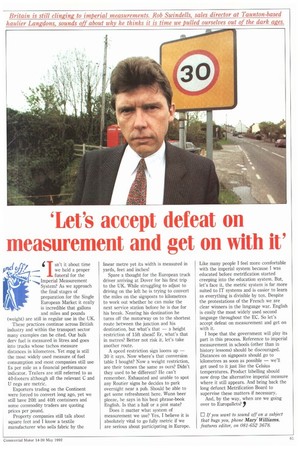'Let's accept defeat on measurement and get on with it'
Page 63

If you've noticed an error in this article please click here to report it so we can fix it.
• sn't it about time we held a proper • funeral for the Imperial Measurement System? As we approach the final stages of preparation for the Single European Market it really is incredible that gallons and miles and pounds (weight) are still in regular use in the UK.
These practices continue across British industry and within the transport sector many examples can be cited. Our bulk dery fuel is measured in litres and goes into trucks whose tachos measure distances in kilometres. Yet mpg is still the most widely used measure of fuel consumption and most companies still use is per mile as a financial performance indicator. Trailers are still referred to as 40-footers although all the relevant C and U regs are metric.
Exporters trading on the Continent were forced to convert long ago, yet we still have 20ft and 40ft containers and some commodity traders are quoting prices per pound.
Property companies still talk about square feet and I know a textile manufacturer who sells fabric by the linear metre yet its width is measured in yards, feet and inches!
Spare a thought for the European truck driver arriving at Dover for his first trip to the UK. While struggling to adjust to driving on the left he is trying to convert the miles on the signposts to kilometres to work out whether he can make the next service station before he is due for his break. Nearing his destination he turns off the motorway on to the shortest route between the junction and his destination, but what's that — a height restriction of 15ft ahead! Er, what's that in metres? Better not risk it, let's take another route.
A speed restriction sign looms up — 30 it says. Now where's that conversion table I bought? Now a weight restriction, are their tonnes the same as ours? Didn't they used to be different? He can't remember. Exhausted and unable to spot any Routier signs he decides to park overnight near a pub. Should be able to get some refreshment here. Wunn beer pleeze, he says in his best phrase-book English. Is that a half or a pint mate?
Does it matter what system of measurement we use? Yes, I believe it is absolutely vital to go fully metric if we are serious about participating in Europe. Like many people I feel more comfortable with the imperial system because I was educated before metrification started creeping into the education system. But, let's face it, the metric system is far more suited to IT systems and is easier to learn as everything is divisible by ten. Despite the protestations of the French we are clear winners in the language war. English is easily the most widely used second language throughout the EC. So let's accept defeat on measurement and get on with it.
I hope that the government will play its part in this process. Reference to imperial measurement in schools (other than in history lessons) should be discouraged. Distances on signposts should go to kilometres as soon as possible — we'll get used to it just like the Celsius temperatures. Product labelling should now drop the alternative imperial measure where it still appears. And bring back the long defunct Metrification Board to supervise these matters if necessary.
And, by the way, when are we going over to Europallets?, 0 If you want to sound off on a subject that bugs you, phone MaryWilliams, features editor, on 081-652 3678.




































































































